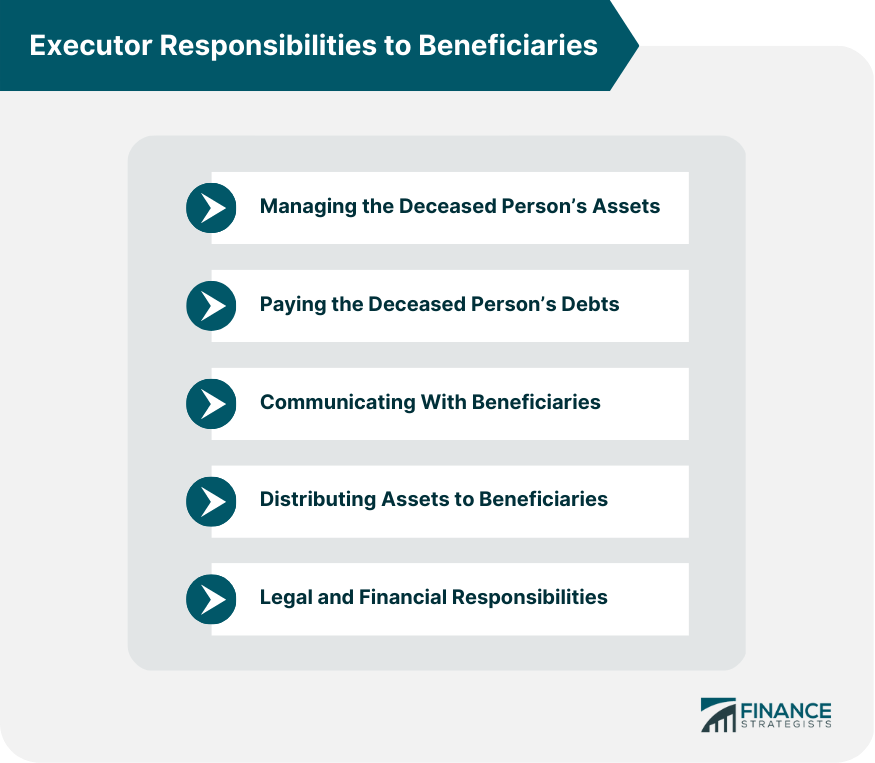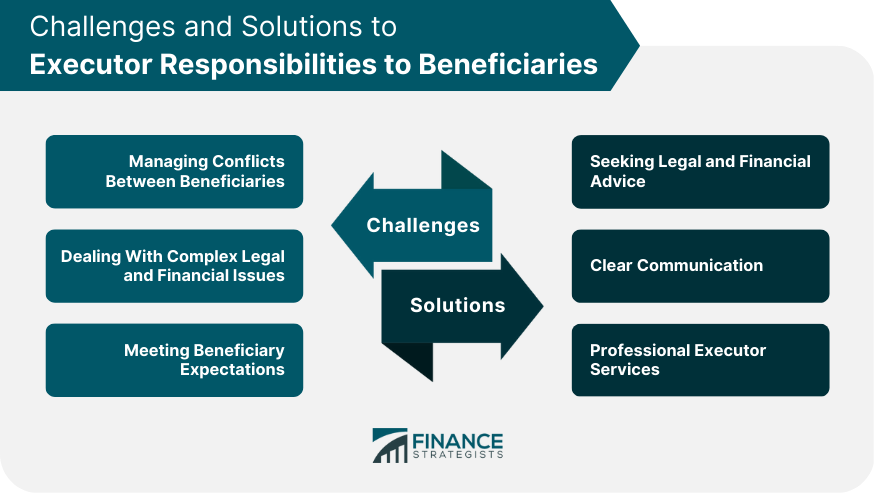An executor is a person who is responsible for carrying out the instructions in the deceased person's will or trust. They are appointed by the deceased person or a court to manage the estate's affairs, including locating and securing assets, paying debts and expenses, communicating with beneficiaries, and distributing assets. Executors have a legal duty to act in the best interests of the estate and its beneficiaries. They can be family members, friends, or professionals such as attorneys or accountants. The role of an executor can be complex and time-consuming, requiring knowledge of legal and financial matters related to estates. Executors must follow state laws and court procedures to ensure that the estate is managed and distributed correctly. An executor's responsibilities may vary depending on the size and complexity of the estate, but all executors have a legal and ethical responsibility to act in the best interests of the beneficiaries. The following are the basic responsibilities of an executor to the beneficiaries: One of the most important responsibilities of an executor is managing the deceased person's assets. This includes locating and securing assets such as property, bank accounts, and investments. The executor must also take steps to protect the assets until they can be distributed to beneficiaries. The executor is responsible for making investment decisions regarding the assets, keeping detailed records of all transactions, and filing tax returns for the estate. Executors are also responsible for paying the deceased person's debts and final expenses. This includes funeral expenses, medical bills, and outstanding debts such as mortgages or loans. The executor must ensure that debts are paid before distributing assets to beneficiaries. If there are insufficient assets to cover the debts, the executor may need to sell assets or seek court approval to pay the debts. Clear communication with beneficiaries is critical for the executor's role. Beneficiaries have a right to be informed of the estate's progress and any issues that arise. The executor should keep beneficiaries updated on the status of the estate, including the value of assets, debts, and expenses. The executor should also respond to beneficiary questions and concerns promptly. The executor is responsible for distributing assets to beneficiaries according to the terms of the will or trust. This includes determining the fair market value of assets and allocating them to beneficiaries. The executor must ensure that beneficiaries receive their rightful share of the estate. If there are disputes or challenges to the will or trust, the executor may need to seek court approval to distribute the assets. Executors have legal and financial responsibilities related to the estate. This includes initiating the probate process if necessary, filing tax returns for the estate, and defending the estate in court if there are challenges to the will or trust. They must follow state laws and court procedures to ensure that the estate is managed and distributed correctly. Managing an estate as an executor comes with various challenges: One of the most significant challenges that executors face is managing conflicts between beneficiaries. Beneficiaries may have different opinions about how the assets should be distributed, or they may have disputes about the value of assets. The executor may need to mediate disagreements or disputes between beneficiaries to ensure that the estate is distributed fairly. Executors must navigate complex legal and financial issues related to estates. This includes understanding tax laws, probate procedures, and estate planning. They may need to seek advice from an estate planning lawyer to ensure that they are following the correct procedures and protecting the estate's assets. Beneficiaries may have high expectations or conflicting demands, which can create pressure for the executor to perform their duties effectively and efficiently while also satisfying the needs of all parties involved. Executors must balance the interests of beneficiaries and follow the deceased person's wishes as outlined in the will or trust. This can be challenging, especially if beneficiaries have unrealistic expectations or misunderstand the legal and financial aspects of the estate. To overcome the challenges faced by executors in their responsibility to beneficiaries, several solutions are available: Executors can seek legal and financial advice to help navigate the complex legal and financial issues related to estates. Attorneys, accountants, and financial advisors can provide guidance and expertise to ensure that the estate is managed and distributed correctly. Professional advice can help executors avoid costly mistakes and mitigate legal and financial risks. Clear and timely communication with beneficiaries can help avoid misunderstandings and disputes. Executors should keep beneficiaries informed of the estate's progress and any issues that arise. The executor should also communicate with beneficiaries regarding the allocation of assets and respond promptly to beneficiary questions and concerns. In some cases, it may be beneficial for the executor to hire professional executor services, such as a trust company or estate planning attorney, to assist with the estate's management and distribution. Professional executor services can provide expertise in navigating complex legal and financial issues and help alleviate the burden on the executor. This can be especially useful for larger or more complex estates. An executor plays a critical role in managing and distributing the assets of a deceased person's estate. Executors have a legal and ethical responsibility to act in the best interests of the estate and its beneficiaries. Their responsibilities include managing the deceased person's assets, paying debts and expenses, communicating with beneficiaries, distributing assets to beneficiaries, and navigating legal and financial issues related to estates. However, being an executor is not without its challenges. Executors must manage conflicts between beneficiaries, deal with complex legal and financial issues, and meet beneficiary expectations. Seeking legal and financial advice, clear communication, and professional executor services can be useful solutions to overcome these challenges. Overall, executors must approach their role with a high degree of diligence, honesty, and transparency. This ensures that the estate is managed and distributed correctly. The role of an executor is a significant responsibility, but with the right approach, it can be an opportunity to honor the deceased person's wishes and provide support to their loved ones.What Is an Executor?
Executor Responsibilities to Beneficiaries
Managing the Deceased Person’s Assets
Paying the Deceased Person’s Debts
Communicating With Beneficiaries
Distributing Assets to Beneficiaries
Complying to Legal and Financial Obligations

Challenges of an Executor’s Responsibility to Beneficiaries
Managing Conflicts Between Beneficiaries
Dealing With Complex Legal and Financial Issues
Meeting Beneficiary Expectations
Solutions to an Executor’s Responsibility to Beneficiaries
Seeking Legal and Financial Advice
Clear Communication
Professional Executor Services

Final Thoughts
Executor Responsibilities to Beneficiaries FAQs
An executor is responsible for locating and securing assets, making investment decisions, filing tax returns, and distributing assets to beneficiaries according to the terms of the will or trust.
Executors may face challenges such as managing conflicts between beneficiaries, dealing with complex legal and financial issues, and meeting beneficiary expectations.
Executors can seek legal and financial advice, maintain clear communication with beneficiaries, and hire professional executor services to overcome challenges.
Yes, an executor can be held legally responsible for mistakes made in managing and distributing an estate, especially if they breach their legal and ethical responsibilities to the beneficiaries.
An executor has a legal obligation to act in the best interests of the estate and its beneficiaries, follow state laws and court procedures, and carry out the instructions in the deceased person's will or trust.
True Tamplin is a published author, public speaker, CEO of UpDigital, and founder of Finance Strategists.
True is a Certified Educator in Personal Finance (CEPF®), author of The Handy Financial Ratios Guide, a member of the Society for Advancing Business Editing and Writing, contributes to his financial education site, Finance Strategists, and has spoken to various financial communities such as the CFA Institute, as well as university students like his Alma mater, Biola University, where he received a bachelor of science in business and data analytics.
To learn more about True, visit his personal website or view his author profiles on Amazon, Nasdaq and Forbes.











